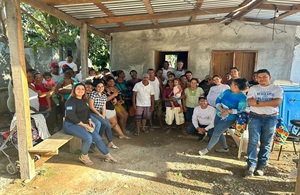UK promotes sustainable fishing and environmental protection in the Atlántida Coast
UK project will allow communities in the Atlántida Seascape, Honduras, to improve small-scale fishing and to strengthen protection of critical marine habitats and species.

The British Ambassador to Honduras, Nick Whittingham, visited the project “Strengthening ecological and socioeconomic resilience in the Atlántida Seascape, Honduras” between 5-8 September. The project is supported through the Darwin Initiative financed by the Department of Environment, Food and Rural Affairs (DEFRA) of the British Government.
The project will support 23 coastal communities located across the Honduran Atlántida Seascape who depend on small-scale fisheries for food security and income. The Atlántida Seascape is home to key populations of locally and globally threatened species, including the hawksbill turtles, the Antillean Manatee, and the endemic Utila spiny-tailed iguana. The seascape faces issues of illegal poaching, pollution and the growing pressure of climate change.
In response to these challenges, the project will focus predominantly on reducing destructive and/ or illegal fishing practices, while helping to build vital ecological and social resilience to climate change reduced impacts, through:
- Sustaining and improving protection and enforcement of critical marine habitats and species;
- Improving small-scale fisheries markets that reward responsible fishers and are more equitable;
- Building recognition of small- scale fisheries’ importance with national government and empowering direct fisher engagement;
- Strengthening and building organisational resilience of existing seascape partners and management platforms to support locally-led, sustainable conservation; and
- Improving understanding of community vulnerabilities to climate change and how to tackle these.
The project has a duration of three years starting from April 2023, with financing of £529,999 (approximately US$675,000) from the British government, and a counterpart contribution of £85,674, which makes a total of US$784,000. The project will be implemented by Fundación Cayos Cochinos in partnership with Fauna & Flora, Asociación Pro Comunidades Turísticas de Honduras, Centro de Estudios Marinos, Fundación Cuero y Salado, and Fundación Islas de la Bahía.